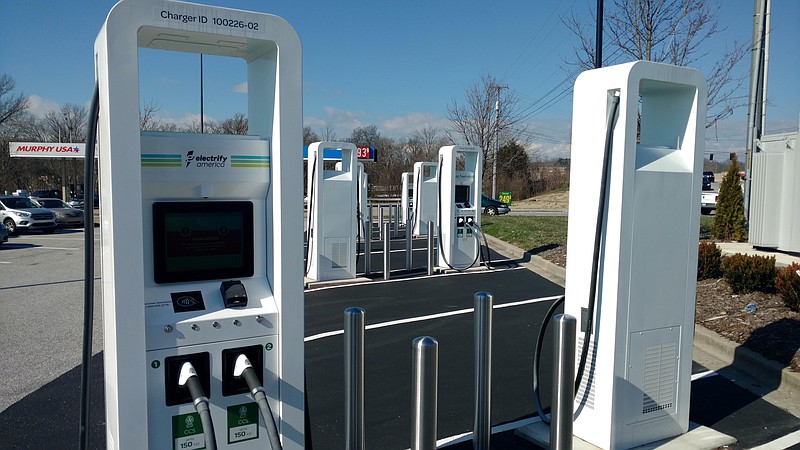With three of the world's biggest car companies each preparing to make electric vehicles in Tennessee, the state's energy supplier is also getting ready to help power the shift from gas-powered to battery-powered vehicles.
The Tennessee Valley Authority on Friday adopted a new commercial rate structure intended to support the expansion of electric vehicle recharging services around Tennessee, especially for high-powered charging stations used by travelers.
"TVA is an industry leader in delivering low-cost, low-carbon energy and we intend to take a similar leadership role in electric vehicle transportation," TVA President Jeff Lyash said.
TVA directors Friday authorized Lyash and his staff to develop a new schedule of electric rates that could effectively cut the energy costs for some high-voltage recharging stations nearly in half by revamping the demand and energy charges imposed for such recharging stations in TVA's standard rates. The change is designed to offer more predictable charges for both the operators of the recharging stations plus vehicle owners using the quick rechargers while traveling.
Dr. Joe Hoagland, vice president of enterprise relations and innovation at TVA, said TVA plans to work with local power companies, private industry, and other governmental agencies in the Valley to help promote electric vehicles. TVA was a pioneer in researching EV applications by building the first vehicle test track for EVs in Chattanooga in the 1970s, but the utility later scaled back much of its research on electric vehicles.
While TVA doesn't plan on getting into the business of making or operating electric vehicles or recharging stations, it is working to help facilitate the growth of others in the field within its seven-state service region.
"Electric vehicles offer a significant opportunity for utilities, and TVA is uniquely suited and uniquely positioned to bring together the stakeholders in the Valley to really drive electrification in the transportation sector unlike any other place in the country," Hoagland said.
The Tennessee Valley is emerging as one of the fastest-growing automotive production regions in the country with Volkswagen, Nissan and General Motors all with plans to make more electric vehicles in Tennessee.
VW is investing $800 million in its Chattanooga assembly plant to make a compact, electric-powered SUV, while GM announced plans this fall to build the Cadillac Lyriq, a small electric SUV, at its Spring Hill factory. Nissan has been building the electric-powered Leaf at its plant Smyrna since 2010.
According to the Environmental Protection Agency, traditional forms of transportation are a leading source of carbon emissions while a single electric vehicle can reduce carbon emissions by 8,600 pounds per year. Having 200,000 EVs on the road would save 4 million metric tons of C02 in five years, Lyash said.
"Actively supporting the electrification of transportation multiplies our own carbon reduction efforts and moves the entire region toward greater sustainability and economic opportunity in the future," he said.
Hoagland said about 80% of the recharging of electric vehicles is expected to be done at home by EV owners and much of that will come during what are otherwise lower demand periods for power consumption. That should help TVA level its energy load and better utilize its generation.
But to convince more people to buy electric vehicles, more and quicker rechargers are needed for many travelers to allay so-called "range anxiety" by motorists fearful that they won't be able to recharge their electric vehicles on the road for longer trips.
In the Tennessee Valley, there are currently 25 high-voltage recharging stations standardized for all electric vehicles, although there are other high-voltage stations for particular models such as the Tesla electric car and there are hundreds of low-voltage recharging stations that take longer to re-energize vehicle batteries.
Lyash said the new rates and plans for supporting electric vehicles should soon be developed and announced in partnership with local power companies and others. TVA officials hope the new rates, combined with the growth in the number of electric vehicles being manufactured each year, will propel more EV use and more recharging locations.
"We won't be in the business of owning charging stations, but we are in the business of delivering power to these stations and our goal is to make it easier for our local power companies and others so they can enter the marketplace," Hoagland said. "At the end of the day, they will be buying TVA power and that will benefit all of us."
Contact Dave Flessner at dflessner@timesfreepress.com or 423-757-6340.
